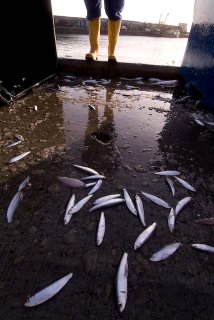Welcome to Through the Gaps, the UK fishing industry's most comprehensive information and image resource. Newlyn is England's largest fish market and where over 50 species are regularly landed from handline, trawl, net, ring net and pot vessels including #MSC Certified #Hake, #Cornish Sardine, handlined bass, pollack and mackerel. Art work, graphics and digital fishing industry images available from stock or on commission.
Tuesday, 10 May 2011
Discards ban - some good news for Cornish boats.
A total ban on the dumping of dead fish back into the sea, which could have threatened the Westcountry fleet, appears to have been averted, industry leaders have said.
In March, EU Fisheries Commissioner Maria Damanaki laid out alternative policies to end so-called fish "discards" in the most radical change to fisheries policy in years.
The announcement followed a high profile campaign, fronted by chef Hugh Fearnley-Whittingstall, which gathered 650,000 signatures for a petition to end the practice. Although industry leaders in Devon and Cornwall described the principle of discards as "despicable", they feared a total ban would damage the industry. "It would probably have resulted in either a very significant reduction in the number of days at sea that would be allowed or a very significant reduction in the number of boats," Jim Portus, chief executive of the South West Fish Producer's Organisation, said. "Either scenario would have been economically damaging for the region."
Mr Portus said an outright ban on discards ignored the fact that many species – including sole, plaice, skates and rays, scallops, crabs, lobsters and most flatfish – survived the catching process. He argued that current quotas overestimated the number of fish killed in the fishing process thereby reducing quotas and the number of fish that could be landed. In a briefing paper prepared for the recent visit of Fisheries Minister Richard Benyon to Brixham, Mr Portus said of a ban on discards "in many cases – and perversely – there would be an increase in mortality" reducing stocks further. Mr Portus said some tagging surveys showed 100 per cent survival rates. The producer's organisation has also offered its support to scientists to conduct survival rate studies during commercial voyages.
The arguments now appear to have been accepted in Brussels, although a total ban is likely to be imposed on some pelagic species, like mackerel, where survival rates are low. Mr Portus said: "The fisheries commissioner has accepted that not all species should be the subject of a discard ban, I'm happy to say. "We do know it is the intention of the commission to ban discards of pelagic fish on January 1, 2015 although it is not at the forefront of the industry in the Westcountry." He added: "We have to assist the commission to come up with solutions that achieve the objective of minimising waste but also achieves the objective of keeping the maximum number of jobs in our fishing community. In disagreeing with the commissioner and people like Hugh Fearnley-Whittingstall, I'm not saying that we don't have to end this waste but that we have to get it into a sense of proportion."
Artice courtesy of ThisIsCornwall
Subscribe to:
Post Comments (Atom)

No comments:
Post a Comment